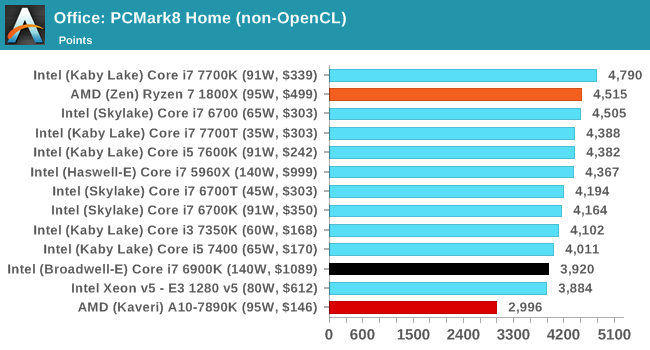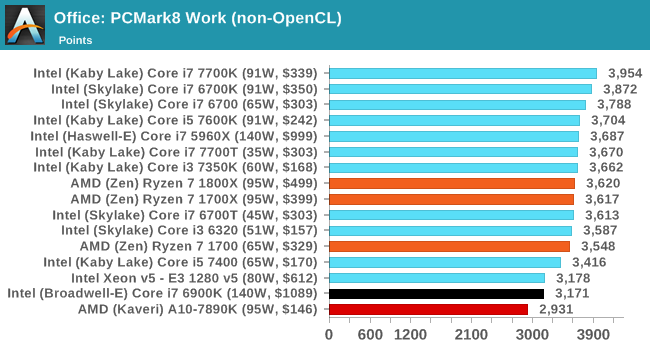The AMD Zen and Ryzen 7 Review: A Deep Dive on 1800X, 1700X and 1700
by Ian Cutress on March 2, 2017 9:00 AM ESTBenchmarking Performance: CPU Office Tests
The office programs we use for benchmarking aren't specific programs per-se, but industry standard tests that hold weight with professionals. The goal of these tests is to use an array of software and techniques that a typical office user might encounter, such as video conferencing, document editing, architectural modelling, and so on and so forth. At present we have two such tools to use.
PCMark8
Despite originally coming out in 2008/2009, Futuremark has maintained PCMark8 to remain relevant in 2017. On the scale of complicated tasks, PCMark focuses more on the low-to-mid range of professional workloads, making it a good indicator for what people consider 'office' work. We run the benchmark from the commandline in 'conventional' mode, meaning C++ over OpenCL, to remove the graphics card from the equation and focus purely on the CPU. PCMark8 offers Home, Work and Creative workloads, with some software tests shared and others unique to each benchmark set. The Creative workload unfortunately seems to fail from the commandline, as the graphical test gives an output of zero (update 3/8: we've found a way around this; will update when we get CPUs retested).


Addendum on 3/8: Originally we posted PCM8 Home scores for Ryzen that were around 3800. On further inspection, these runs were misconfigured due to circumstances beyond our control, and test data is being re-run. The Ryzen 7 1800X in this instance scores 4515.
SYSmark 2014
SYSmark is developed by Bapco, a consortium of industry CPU companies. The goal of SYSmark is to take stripped down versions of popular software, such as Photoshop and Onenote, and measure how long it takes to process certain tasks within that software. The end result is a score for each of the three segments (Office, Media, Data) as well as an overall score. Here a reference system (Core i3-4130, 4GB DRAM, 500GB HDD) is used to provide a baseline score of 1000. A newer version of the benchmark (2014 SE) will be used in future reviews.
A note on contect for these numbers. AMD left Bapco in the last two years, due to differences of opinion on how the benchmarking suites were angled towards Intel processors and had optimizations to show bigger differences than what AMD felt was present. The following benchmarks are provided as data, but the conflict of opinion between the two companies on the validity of the benchmark is provided as context for the following numbers.














574 Comments
View All Comments
deltaFx2 - Wednesday, March 8, 2017 - link
@Meteor2: No. Consumer GPUs have poor throughput for Double precision FP. So you can't push those to the GPU (unless you own those super-expensive Nvidia compute cards). Apparently, many rendering/video editing programs use GPUs for preview but do the final rendering on CPU. Quality, apparently, and might be related to DP FP. I'm not the expert, so if you know otherwise, I'd be happy to be corrected and educated. Also, you could make the same argument about AVX-256.The quoted paragraph is probably the only balanced statement in that entire review. Compare the tone of that review with AT review above.
On an unrelated note, there's the larger question of running games at low res on top-end gpus and comparing frame-rates that far exceed human perception. I know, they have to do something, so why not just do this. The rationale is: " In future a faster GPU in future will create a bottleneck ". If this is true, it should be easy to demonstrate, right? Just dig through a history of Intel desktop CPUs paired with increasingly powerful GPUs and see how it trends. There's not one reviewer that has proven that this is true. It's being taken as gospel. OTOH, plenty of folks seem happy with their Sandy Bridge + Nvidia 1080, so clearly the bottleneck isn't here 5 years after SB. Maybe, just maybe, it's because the differences are imperceptible?
Ryzen clearly has some bottlenecks but the whole gaming thing is a tempest in a tea-cup.
theuglyman0war - Thursday, March 9, 2017 - link
ZBRUSHprobably 90% of all 3d assets that are created from concept ( NOT SCANNED )
Went through Zbrush at some point.
Which means no GPU acceleration at all.
Renderman
Maxwell
Vray
Arnold
still all use CPU rendering As do a mountain of other renderers.
Arnold will be getting an option
But the two popular GPU renderers are Otoy Octane and Redshift...
The have their excellent expensive place. But the majority of rendering out there is still suffered through software rendering. And will always be a valid concern as long as they come FREE built into major DCC applications.
theuglyman0war - Thursday, March 9, 2017 - link
Saw that same GPU trumps CPU render validity concerns...Comment and had a good laugh.
I'll remember to spread that around every time I see Renderman Vray Arnold Maxwell sans GPU rendering going on.
Or the next time a Mercury engine update negates all non Quadro GPU acceleration.
To be fair a lot of creative pros and tech artists seem to disagree with me but...
The only time between pulling vrts in Maya and brushing a surface in Zbrush that I really feel that I am suffering buckets of tears and desire a new CPU ( still on i7-980x ) is when I am cussing out a progress bar that is teasing me with it's slow progress. And that means CORES! encoding... un compressing... Rendering! Otherwise I could probably not notice day to day on a ten year old CPU. ( excluding CPU bound gaming of course... talking bout day to day vrt pulling )
I was just as productive in 2007 as I am today.
MaidoMaido - Saturday, March 4, 2017 - link
Been trying to find a review including practical benchmarks for common video editing / motion graphics applications like After Effects, Resolve, Fusion, Premiere, Element 3D.In a lot of these tasks, the multithreading is not always the best, as a result quad core 6700K often outperforms the more expensive Xeon and 5960X etc
deltaFx2 - Saturday, March 4, 2017 - link
I would recommend this response to the GamersNexus hit piece: https://www.reddit.com/r/Amd/comments/5xgonu/analy...The i5 level performance is a lie.
Notmyusualid - Saturday, March 4, 2017 - link
@ deltaFx2Sorry, not reading a 4k worded response. I'll wait for Anand to finish its Ryzen reviews before I draw any final conclusions.
Meteor2 - Tuesday, March 7, 2017 - link
@deltaFX2 RE: in the 4k word Reddit 'rebuttal', what that person seems to be saying, is that once you've converted your $500 Ryzen 1800X into a 8C/8T chip, _then_ it beats a $240 i5, while still falling short of the $330 i7. Out-of-the-box, it has worse gaming performance than either Intel chip.That's not exactly a ringing endorsement.
The analysis in the Anandtech forums, which concludes that in a certain narrow and low power band a heavily down-clocked 1800X happens to get excellent performance/W, isn't exactly thrilling either.
deltaFx2 - Wednesday, March 8, 2017 - link
@ Meteor2: The anandtech forum thing: Perf/watt matters for servers and laptop. Take a look at the IPC numbers too. His average is that Zen == Broadwell IPC, and ~10% behind Sky/Kaby lake (except for AVX256 workloads). That's not too shabby at all for a $300 part.You completely missed the point of the reddit rebuttal. The GN reviewer drops i5s from plenty of tests citing "methodological reasons", but then says R7==i5 in gaming. The argument is that plenty of games use >4 threads and that puts i5 at a disadvantage.
tankNZ - Sunday, March 5, 2017 - link
yes I agree, it's even better than okay for gaming[img]http://smsh.me/li3a.png[/img]deltaFx2 - Monday, March 6, 2017 - link
You may wish to see this though: https://forums.anandtech.com/threads/ryzen-strictl... Way, way, more detailed than any tech media review site can hope to get. No, it's got nothing to do with gaming. Gaming isn't the story here. AMD's current situation in x86 market share had little to do with gaming efficiency, but perf/watt.I'll quote the author: "850 points in Cinebench 15 at 30W is quite telling. Or not telling, but absolutely massive. Zeppelin can reach absolutely monstrous and unseen levels of efficiency, as long as it operates within its ideal frequency range."